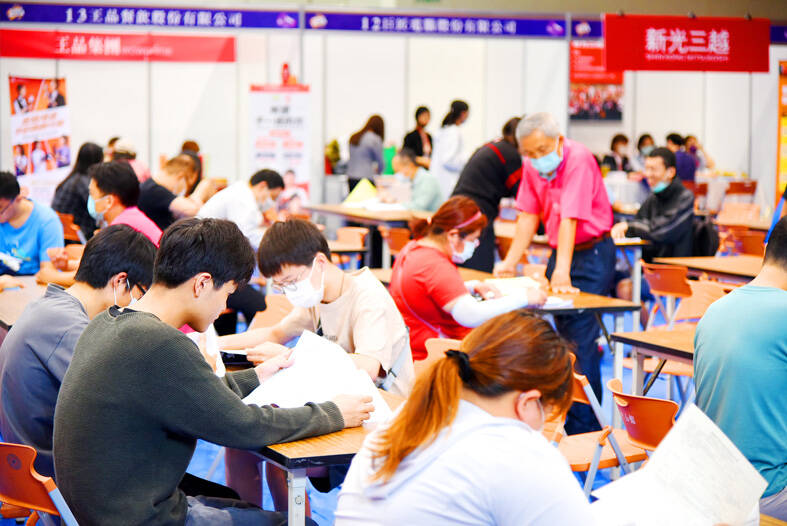The nation’s jobless rate last month grew 0.03 percentage points to 3.56 percent due to employee resignations, adding to unemployment caused by business downsizing and closures, the Directorate-General of Budget, Accounting and Statistics (DGBAS) said yesterday.
Despite the increase, last month’s data represented the lowest March jobless rate in 23 years and is expected to drop further this month, DGBAS Census Department Deputy Director Chen Hui-hsin (陳惠欣) said.
“The noticeable advance in the number of people who are jobless because of resignations shows that many of them need more time to land satisfactory positions,” Chen said.

Photo courtesy of the Workforce Development Agency
Although the increase is at odds with historical data, the job market is stable, she added.
The observation is supported by seasonal adjustments in the jobless rates, showing that it rose a fractional 0.01 percentage points to 3.59 percent, also the lowest in 23 years, Chen said.
The total jobless population stood at 424,000, rising 0.94 percent, or by about 4,000 people, from February, the DGBAS said.
Although resignations lifted the rate, the number of people who lost work to business downsizing and closures subsided, it added.
Job losses linked to the COVID-19 pandemic have reduced by 24,000 since July last year, Chen said.
However, the number of people who work fewer than 35 hours per week rose by 10,000 to 195,000, she added.
An ongoing global economic slowdown has prompted local manufacturers to cut capacity and headcounts to cope with poor end-market demand for Taiwanese goods, mainly electronics used in consumer devices.
The unemployment period averaged 22.6 weeks, shorter by 0.5 weeks from a month earlier, but stretched to 25.1 weeks for first-time jobseekers, the DGBAS said.
By educational breakdown, people with university degrees had the highest unemployment rate at 4.97 percent, followed by those with high-school diplomas at 3.26 percent and people with graduate degrees at 2.8 percent, it said.
The unemployment rate for people with junior college diplomas stood at 2.61 percent and 2.43 percent for people with only junior-high school education, it said.
By demographics, people aged 20 to 24 had the highest unemployment rate at 11.8 percent, followed by the 15 to 19 age group at 8.14 percent, the 25 to 29 age group at 6.24 percent and the 30 to 34 age bracket at 3.74 percent, it said.
People aged 45 to 64 had the lowest jobless rate of 2.23 percent, it said.

Semiconductor business between Taiwan and the US is a “win-win” model for both sides given the high level of complementarity, the government said yesterday responding to tariff threats from US President Donald Trump. Home to the world’s largest contract chipmaker, Taiwan Semiconductor Manufacturing Co (TSMC, 台積電), Taiwan is a key link in the global technology supply chain for companies such as Apple Inc and Nvidia Corp. Trump said on Monday he plans to impose tariffs on imported chips, pharmaceuticals and steel in an effort to get the producers to make them in the US. “Taiwan and the US semiconductor and other technology industries

A start-up in Mexico is trying to help get a handle on one coastal city’s plastic waste problem by converting it into gasoline, diesel and other fuels. With less than 10 percent of the world’s plastics being recycled, Petgas’ idea is that rather than letting discarded plastic become waste, it can become productive again as fuel. Petgas developed a machine in the port city of Boca del Rio that uses pyrolysis, a thermodynamic process that heats plastics in the absence of oxygen, breaking it down to produce gasoline, diesel, kerosene, paraffin and coke. Petgas chief technology officer Carlos Parraguirre Diaz said that in

CHIP WAR: Tariffs on Taiwanese chips would prompt companies to move their factories, but not necessarily to the US, unleashing a ‘global cross-sector tariff war’ US President Donald Trump would “shoot himself in the foot” if he follows through on his recent pledge to impose higher tariffs on Taiwanese and other foreign semiconductors entering the US, analysts said. Trump’s plans to raise tariffs on chips manufactured in Taiwan to as high as 100 percent would backfire, macroeconomist Henry Wu (吳嘉隆) said. He would “shoot himself in the foot,” Wu said on Saturday, as such economic measures would lead Taiwanese chip suppliers to pass on additional costs to their US clients and consumers, and ultimately cause another wave of inflation. Trump has claimed that Taiwan took up to

SMALL AND EFFICIENT: The Chinese AI app’s initial success has spurred worries in the US that its tech giants’ massive AI spending needs re-evaluation, a market strategist said Chinese artificial intelligence (AI) start-up DeepSeek’s (深度求索) eponymous AI assistant rocketed to the top of Apple Inc’s iPhone download charts, stirring doubts in Silicon Valley about the strength of the US’ technological dominance. The app’s underlying AI model is widely seen as competitive with OpenAI and Meta Platforms Inc’s latest. Its claim that it cost much less to train and develop triggered share moves across Asia’s supply chain. Chinese tech firms linked to DeepSeek, such as Iflytek Co (科大訊飛), surged yesterday, while chipmaking tool makers like Advantest Corp slumped on the potential threat to demand for Nvidia Corp’s AI accelerators. US stock